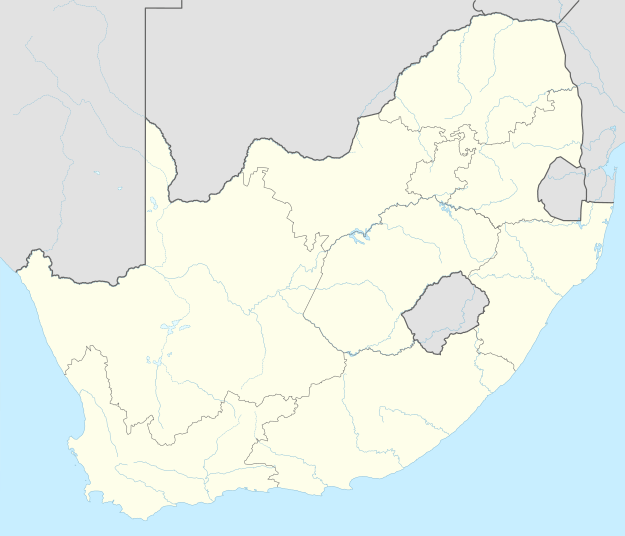2013 Africa Cup of Nations
| |
|---|---|
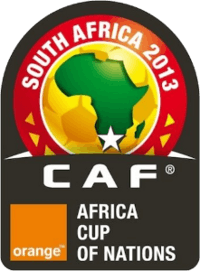 Tournament logo | |
| Tournament details | |
| Host country | South Africa |
| Dates | 19 January – 10 February |
| Teams | 16 (from 1 confederation) |
| Venue(s) | 5 (in 5 host cities) |
| Final positions | |
| Champions |
|
| Runners-up |
|
| Third place |
|
| Fourth place |
|
| Tournament statistics | |
| Matches played | 32 |
| Goals scored | 69 (2.16 per match) |
| Attendance | 729,000 (22,781 per match) |
| Top scorer(s) |
(4 goals each) |
| Best player |
|
The 2013 Africa Cup of Nations, also known as the Orange Africa Cup of Nations South Africa 2013 for sponsorship reasons, held from 19 January to 10 February 2013, was the 29th Africa Cup of Nations, the football championship of Africa organized by the Confederation of African Football (CAF).[1] Starting from this edition, the tournament was switched to being held in odd-numbered years instead of even-numbered years so that it does not clash with the FIFA World Cup.[2]
South Africa hosted the tournament for the second time, after previously hosting the 1996 African Cup of Nations. The 2013 tournament is the highest attended edition of the Africa Cup of Nations under the current, 16-team format. The South African team was eliminated in the quarter-finals by Mali, following a penalty shoot-out.
Nigeria won its third Africa Cup of Nations championship with a 1–0 victory over Burkina Faso in the final. Nigeria participated in the 2013 FIFA Confederations Cup in Brazil as the representative from CAF.[3]
Host selection
Bids :
Rejected Bids :
On 4 September 2006, the Confederation of African Football (CAF) approved a compromise between rival countries to host the Africa Cup of Nations after it ruled out Nigeria. CAF agreed to award the next three editions from 2010 to Angola, Equatorial Guinea, Gabon and Libya respectively. They assigned Angola in 2010, Equatorial Guinea and Gabon, which submitted a joint bid in 2012, and Libya for 2014.
This edition was awarded to Libya for the second time after 1982 African Cup of Nations.
Two-time former host Nigeria is the reserve host for the 2010, 2012 and 2014 tournaments, in the event that any of the host countries fails to meet the requirements established by CAF.
The 2014 tournament was pushed forward to 2013 and subsequently held in odd-numbered years to avoid year-clash with the FIFA World Cup.[2]
Libyan withdrawal
Due to the Libyan Civil War, Libya traded years with South Africa, so that South Africa hosted in 2013 and Libya will be hosting in 2017. This was ratified in September 2011 at CAF's Executive Committee in Cairo, Egypt.[4]
Qualification
A total of 47 countries entered the qualification, including South Africa, which automatically qualified. Libya was not allowed to keep its automatic qualification after being stripped of its hosting rights due to the Libyan Civil War. Many teams made their return to the finals in this tournament. The hosts, South Africa returned after a 4-year absence. Ethiopia appeared for the first time since 1982 (a 31-year absence). Other teams absent from the 2012 finals that featured in 2013 were Nigeria, Togo, DR Congo, and Algeria. Cape Verde made its finals debut. Teams that didn't qualify for this tournament from the 2012 African Cup of Nations were both co-hosts, Gabon and Equatorial Guinea, Libya, Senegal, Sudan, Guinea and Botswana. South Sudan was ineligible to participate as the qualifying competition had already started by the time its membership of CAF was confirmed.
Qualified nations
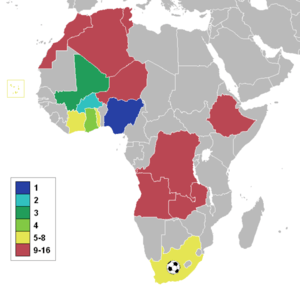
| Country | Qualified as | Qualification date | Previous appearances in tournament† |
|---|---|---|---|
| Hosts | 28 September 2011 | 7 (1996, 1998, 2000, 2002, 2004, 2006, 2008) | |
| Winner against Malawi | 13 October 2012 | 18 (1963, 1965, 1968, 1970, 1978, 1980, 1982, 1984, 1992, 1994, 1996, 1998, 2000, 2002, 2006, 2008, 2010, 2012) | |
| Winner against Botswana | 13 October 2012 | 7 (1972, 1994, 2002, 2004, 2008, 2010, 2012) | |
| Winner against Uganda | 13 October 2012 | 15 (1974, 1978, 1982, 1986, 1990, 1992, 1994, 1996, 1998, 2000, 2002, 2006, 2008, 2010, 2012) | |
| Winner against Liberia | 13 October 2012 | 16 (1963, 1976, 1978, 1980, 1982, 1984, 1988, 1990, 1992, 1994, 2000, 2002, 2004, 2006, 2008, 2010) | |
| Winner against Sierra Leone | 13 October 2012 | 15 (1962, 1963, 1965, 1978, 1982, 1994, 1996, 1998, 2000, 2002, 2004, 2006, 2008, 2010, 2012) | |
| Winner against Senegal | 13 October 2012 | 19 (1965, 1968, 1970, 1974, 1980, 1984, 1986, 1988, 1990, 1992, 1994, 1996, 1998, 2000, 2002, 2006, 2008, 2010, 2012) | |
| Winner against Mozambique | 13 October 2012 | 14 (1972, 1976, 1978, 1980, 1986, 1988, 1992, 1998, 2000, 2002, 2004, 2006, 2008, 2012) | |
| Winner against Sudan | 14 October 2012 | 9 (1957, 1959, 1962, 1963, 1965, 1968, 1970, 1976, 1982) | |
| Winner against Cameroon | 14 October 2012 | 0 (debut) | |
| Winner against Zimbabwe | 14 October 2012 | 6 (1996, 1998, 2006, 2008, 2010, 2012) | |
| Winner against Guinea | 14 October 2012 | 1 (2012) | |
| Winner against Gabon | 14 October 2012 | 6 (1972, 1984, 1998, 2000, 2002, 2006) | |
| Winner against Equatorial Guinea | 14 October 2012 | 15 (1965, 1968, 1970, 1972, 1974, 1976, 1988, 1992, 1994, 1996, 1998, 2000, 2002, 2004, 2006) | |
| Winner against Central African Rep. | 14 October 2012 | 8 (1978, 1996, 1998, 2000, 2002, 2004, 2010, 2012) | |
| Winner against Libya | 14 October 2012 | 14 (1968, 1980, 1982, 1984, 1986, 1988, 1990, 1992, 1996, 1998, 2000, 2002, 2004, 2010) |
- † Bold indicates champion for that year
- † Italic indicates host
Venues
Host cities
The South African Football Association opened bidding to all 2010 FIFA World Cup host cities[5] however a maximum of seven venues would be used.[6] The final list of stadiums was initially to be announced by 30 March,[7] but was pushed back to 4 April,[8] 20 April, and then 3 May 2012.[9]
The venues were announced on 4 May 2012. FNB Stadium hosted the opening match and the final.[10] The other venues selected for matches were Mbombela Stadium, Nelson Mandela Bay Stadium, Royal Bafokeng Stadium and Moses Mabhida Stadium.[11]
The average daytime temperature of the host cities ranges from 25.0 °C (77.0 °F) to 30.3 °C (86.5 °F).[12]
| Johannesburg1 | Durban1 | Port Elizabeth1 | |||
|---|---|---|---|---|---|
| FNB Stadium23 | Moses Mabhida Stadium | Nelson Mandela Bay Stadium | |||
| 26°14′5.27″S 27°58′56.47″E / 26.2347972°S 27.9823528°E | 29°49′46″S 31°01′49″E / 29.82944°S 31.03028°E | 33°56′16″S 25°35′56″E / 33.93778°S 25.59889°E | |||
| Capacity: 94,700 | Capacity: 54,0004 | Capacity: 48,000 | |||
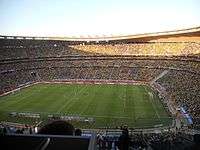 |
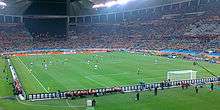 |
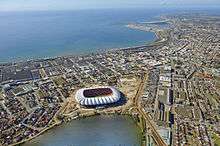 | |||
| Nelspruit | Rustenburg | ||||
| 25°27′42″S 30°55′47″E / 25.46172°S 30.929689°E | 25°34′43″S 27°09′39″E / 25.5786°S 27.1607°E | ||||
| Mbombela Stadium | Royal Bafokeng Stadium | ||||
| Capacity: 41,000 | Capacity: 42,000 | ||||
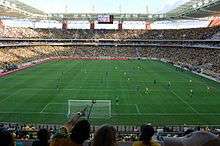 |
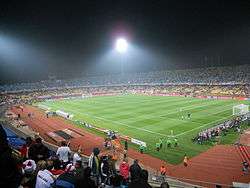 | ||||
Training venues
| Host city | Venues |
|---|---|
| Durban | Durban Peoples Park, King Zwelithini Stadium, Princess Magogo Stadium |
| Johannesburg | Dobsonville Stadium, Millpark Stadium, Orlando Stadium, Rand Stadium[13] |
| Nelspruit | |
| Port Elizabeth | Gelvandale Stadium, NMMU Stadium, Westbourne Oval, Zwide Stadium[14] |
| Rustenburg |
Match ball
The official match ball for the 2013 Africa Cup of Nations was manufactured by Adidas and named the Katlego, which means "success" in Sotho language. The name was chosen by African football fans via an online voting competition where it beat alternate names, Khanya (light) and Motswako (mixture).[15]
Mascot
The official mascot of the tournament was Takuma, a hippo wearing sports kit in South Africa's official yellow and green. The mascot was designed by Tumelo Nkoana, a 13-year-old South African student from Hammanskraal in Gauteng.[16]
Draw
The draw for the final tournament took place on 24 October 2012 in Durban.[17][18] Positions A1 and C1 were already assigned to the hosts (South Africa) and holders (Zambia) respectively.[19] The other 14 qualified teams were ranked based on their performances during the last three Africa Cup of Nations, i.e. the 2008, 2010 and 2012 editions.
| Classification | Points awarded |
|---|---|
| Winner | 7 |
| Runner-up | 5 |
| Losing semi-finalists | 3 |
| Losing quarter-finalists | 2 |
| Eliminated in 1st round | 1 |
Moreover, a weighted coefficient on points was given to each of the last three editions of the Africa Cup of Nations as follows:
- 2012 edition: points to be multiplied by 3
- 2010 edition: points to be multiplied by 2
- 2008 edition: points to be multiplied by 1
The teams were then divided into four pots based on the ranking. Each group contained one team from each pot.[20]
| Pot 1 | Pot 2 | Pot 3 | Pot 4 |
|---|---|---|---|
|
|
|
|
|
Match officials
The following referees were chosen for the 2013 Africa Cup of Nations.[21]
- Referees
|
|
|
- Assistant referees
Squads
Each team can register a squad of 23 players.[19]
Group stage
The schedule of the final tournament was released on 8 September 2012.[22]
- Tie-breaking criteria
If two or more teams end the group stage with the same number of points, their ranking is determined by the following criteria:[19]
- points earned in the matches between the teams concerned;
- goal difference in the matches between the teams concerned;
- number of goals scored in the matches between the teams concerned;
- goal difference in all group matches;
- number of goals scored in all group matches;
- fair play points system taking into account the number of yellow and red cards;
- drawing of lots by the organising committee.
| Key to colours in group tables |
|---|
| Top two placed teams advanced to the quarterfinals |
All times South African Standard Time (UTC+2)
Group A
| Team | Pld |
W |
D |
L |
GF |
GA |
GD |
Pts |
|---|---|---|---|---|---|---|---|---|
| 3 | 1 | 2 | 0 | 4 | 2 | +2 | 5 | |
| 3 | 1 | 2 | 0 | 3 | 2 | +1 | 5 | |
| 3 | 0 | 3 | 0 | 3 | 3 | 0 | 3 | |
| 3 | 0 | 1 | 2 | 1 | 4 | −3 | 1 |
| 19 January 2013 | |||
| South Africa | 0–0 | FNB Stadium, Johannesburg | |
| Angola | 0–0 | FNB Stadium, Johannesburg | |
| 23 January 2013 | |||
| South Africa | 2–0 | Moses Mabhida Stadium, Durban | |
| Morocco | 1–1 | Moses Mabhida Stadium, Durban | |
| 27 January 2013 | |||
| Morocco | 2–2 | Moses Mabhida Stadium, Durban | |
| Cape Verde | 2–1 | Nelson Mandela Bay Stadium, Port Elizabeth |
Group B
| Team | Pld |
W |
D |
L |
GF |
GA |
GD |
Pts |
|---|---|---|---|---|---|---|---|---|
| 3 | 2 | 1 | 0 | 6 | 2 | +4 | 7 | |
| 3 | 1 | 1 | 1 | 2 | 2 | 0 | 4 | |
| 3 | 0 | 3 | 0 | 3 | 3 | 0 | 3 | |
| 3 | 0 | 1 | 2 | 0 | 4 | −4 | 1 |
Group C
| Team | Pld |
W |
D |
L |
GF |
GA |
GD |
Pts |
|---|---|---|---|---|---|---|---|---|
| 3 | 1 | 2 | 0 | 5 | 1 | +4 | 5 | |
| 3 | 1 | 2 | 0 | 4 | 2 | +2 | 5 | |
| 3 | 0 | 3 | 0 | 2 | 2 | 0 | 3 | |
| 3 | 0 | 1 | 2 | 1 | 7 | −6 | 1 |
| 21 January 2013 | |||
| Zambia | 1–1 | Mbombela Stadium, Nelspruit | |
| Nigeria | 1–1 | Mbombela Stadium, Nelspruit | |
| 25 January 2013 | |||
| Zambia | 1–1 | Mbombela Stadium, Nelspruit | |
| Burkina Faso | 4–0 | Mbombela Stadium, Nelspruit | |
| 29 January 2013 | |||
| Burkina Faso | 0–0 | Mbombela Stadium, Nelspruit | |
| Ethiopia | 0–2 | Royal Bafokeng Stadium, Rustenburg |
Group D
| Team | Pld |
W |
D |
L |
GF |
GA |
GD |
Pts |
|---|---|---|---|---|---|---|---|---|
| 3 | 2 | 1 | 0 | 7 | 3 | +4 | 7 | |
| 3 | 1 | 1 | 1 | 4 | 3 | +1 | 4 | |
| 3 | 1 | 1 | 1 | 2 | 4 | −2 | 4 | |
| 3 | 0 | 1 | 2 | 2 | 5 | −3 | 1 |
| 22 January 2013 | |||
| Ivory Coast | 2–1 | Royal Bafokeng Stadium, Rustenburg | |
| Tunisia | 1–0 | Royal Bafokeng Stadium, Rustenburg | |
| 26 January 2013 | |||
| Ivory Coast | 3–0 | Royal Bafokeng Stadium, Rustenburg | |
| Algeria | 0–2 | Royal Bafokeng Stadium, Rustenburg | |
| 30 January 2013 | |||
| Algeria | 2–2 | Royal Bafokeng Stadium, Rustenburg | |
| Togo | 1–1 | Mbombela Stadium, Nelspruit |
Knockout phase
In the knockout stages, if a match is level at the end of normal playing time, extra time shall be played (two periods of 15 minutes each) and followed, if necessary, by kicks from the penalty mark to determine the winner, except for the play-off for third place where no extra time shall be played.[19]
| Quarter-finals | Semi-finals | Final | ||||||||
| 2 February – Durban | ||||||||||
| 1 (1) | ||||||||||
| 6 February – Durban | ||||||||||
| 1 (3) | ||||||||||
| 1 | ||||||||||
| 3 February – Rustenburg | ||||||||||
| 4 | ||||||||||
| 1 | ||||||||||
| 10 February – Johannesburg | ||||||||||
| 2 | ||||||||||
| 1 | ||||||||||
| 3 February – Nelspruit | ||||||||||
| 0 | ||||||||||
| 1 | ||||||||||
| 6 February – Nelspruit | ||||||||||
| 0 | ||||||||||
| 1 (3) | ||||||||||
| 2 February – Port Elizabeth | ||||||||||
| 1 (2) | Third place | |||||||||
| 2 | ||||||||||
| 9 February – Port Elizabeth | ||||||||||
| 0 | ||||||||||
| 3 | ||||||||||
| 1 | ||||||||||
Quarter-finals
| Ghana |
2–0 | |
|---|---|---|
| Wakaso |
Report |
| South Africa |
1–1 (a.e.t.) | |
|---|---|---|
| Rantie |
Report | Keita |
| Penalties | ||
| Tshabalala Furman Mahlangu Majoro |
1–3 | |
Semi-finals
Third place play-off
Final
| Nigeria |
1–0 | |
|---|---|---|
| Mba |
Report |
Winners
| 2013 Africa Cup of Nations Champions |
|---|
Nigeria Third title |
Player awards
The following awards were given for the tournament:[24]
- Orange Player of the Tournament
- Pepsi Tournament Top Scorer
| Player name | Games played | Goals scored | Assists | Minutes played | Source |
|---|---|---|---|---|---|
| 5 | 4 | 3 | 403 | [25] | |
| 5 | 4 (3 penalties) | 0 | 396[26] | [27] |
- Samsung Fair Player of the Tournament
- Nissan Goal of the tournament
- Team of the Tournament
| Goalkeeper | Defenders | Midfielders | Forwards |
|---|---|---|---|
Goalscorers
- 4 goals
- 3 goals
- 2 goals
|
|
|
|
- 1 goal
Team statistics
(1) – Total games lost not counted in total games played (total games lost = total games won) (2) – Total number of games drawn (tied) for all teams = Total number of games drawn (tied) ÷ 2 (both teams involved) (3) – As per statistical convention in football, matches decided in extra time are counted as wins and losses, while matches decided by penalty shoot-outs are counted as draws. MarketingMediaSouth African public broadcaster SABC was the host broadcaster of the tournament. It paid R65 million (US$7.5 million) for the rights, which entitle it to transmit all of the games across its radio and television platforms. Broadcasting
References
External links
| ||||||||||||||||||||||||||||||||||||||||||||||||||||||||||||||||||||||||||||||||||||||||||||||||||||||||||||||||||||||||||||||||||||||||||||||||||||||||||||||||||||||||||||||||||||||||||||||||||||||||||||||||||||||||||||||||||||||||||||||||||||||||||||||||||||||||||||
